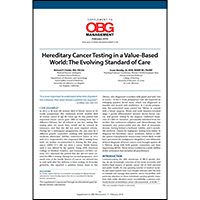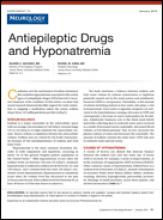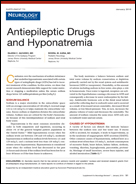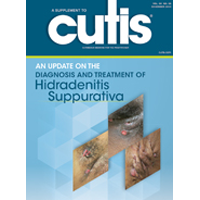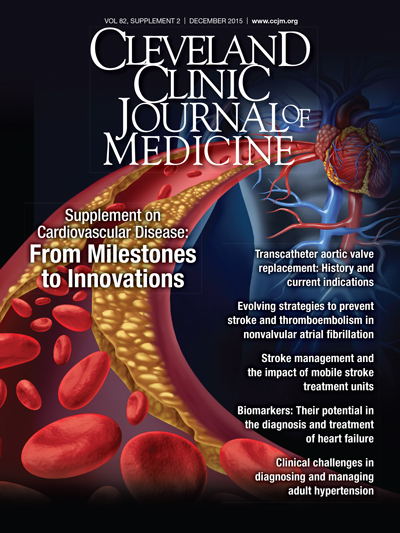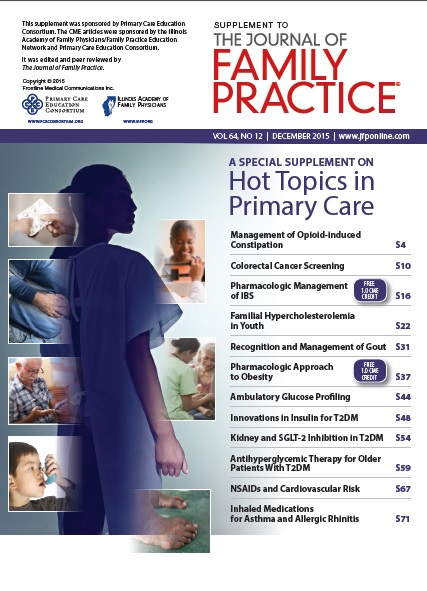User login
Rare Neurological Disease Special Report
Click here to visit the digital edition.
Click here to visit the digital edition.
Click here to visit the digital edition.
Hereditary Cancer Testing in a Value Based World: The Evolving Standard of Care
Commemorating the 20th anniversary of BRCA genetic testing, we are increasingly conscious of the social, economic, and medico-legal impacts of genetic cancer risk on both personal and public health. An ever-growing number of medical societies and expert panels have now charged clinicians with the duty to evaluate and manage their patients’ cancer risk profiles, with particular attention to those individuals carrying genetic mutations that confer elevated cancer susceptibility, a process commonly known as hereditary cancer risk assessment, or HCRA.
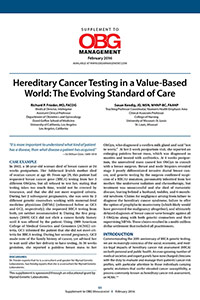
Click here to download the PDF.
This article is written for women’s health care clinicians, and will address the current status of hereditary cancer genetic testing, focusing on the evolution of pan-cancer, multigene panel testing in the context of value-based medicine.
Click on the video below to watch Dr. Frieder discuss Hereditary Cancer Testing.
Commemorating the 20th anniversary of BRCA genetic testing, we are increasingly conscious of the social, economic, and medico-legal impacts of genetic cancer risk on both personal and public health. An ever-growing number of medical societies and expert panels have now charged clinicians with the duty to evaluate and manage their patients’ cancer risk profiles, with particular attention to those individuals carrying genetic mutations that confer elevated cancer susceptibility, a process commonly known as hereditary cancer risk assessment, or HCRA.

Click here to download the PDF.
This article is written for women’s health care clinicians, and will address the current status of hereditary cancer genetic testing, focusing on the evolution of pan-cancer, multigene panel testing in the context of value-based medicine.
Click on the video below to watch Dr. Frieder discuss Hereditary Cancer Testing.
Commemorating the 20th anniversary of BRCA genetic testing, we are increasingly conscious of the social, economic, and medico-legal impacts of genetic cancer risk on both personal and public health. An ever-growing number of medical societies and expert panels have now charged clinicians with the duty to evaluate and manage their patients’ cancer risk profiles, with particular attention to those individuals carrying genetic mutations that confer elevated cancer susceptibility, a process commonly known as hereditary cancer risk assessment, or HCRA.

Click here to download the PDF.
This article is written for women’s health care clinicians, and will address the current status of hereditary cancer genetic testing, focusing on the evolution of pan-cancer, multigene panel testing in the context of value-based medicine.
Click on the video below to watch Dr. Frieder discuss Hereditary Cancer Testing.
2015 MS Highlights: The Year in Review
Click here to download the PDF.
Click here to download the PDF.
Click here to download the PDF.
Antiepileptic Drugs and Hyponatremia
2016 Directory of VA and DoD Facilities
Click here to access the 2016 Directory of VA and DoD Facilities Digital Edition
Table of Contents
- Letter From the Publisher
- Explanatory Notes and Abbreviation Key
- Veterans Integrated Service Network (VISN) Guide / MyVA Regions Guide
- Department of Veterans Affairs Health Care Facilities
- TRICARE Region Guide
- Department of Defense Health Care Facilities

Click here to access the 2016 Directory of VA and DoD Facilities Digital Edition
Table of Contents
- Letter From the Publisher
- Explanatory Notes and Abbreviation Key
- Veterans Integrated Service Network (VISN) Guide / MyVA Regions Guide
- Department of Veterans Affairs Health Care Facilities
- TRICARE Region Guide
- Department of Defense Health Care Facilities

Click here to access the 2016 Directory of VA and DoD Facilities Digital Edition
Table of Contents
- Letter From the Publisher
- Explanatory Notes and Abbreviation Key
- Veterans Integrated Service Network (VISN) Guide / MyVA Regions Guide
- Department of Veterans Affairs Health Care Facilities
- TRICARE Region Guide
- Department of Defense Health Care Facilities

Abstracts Presented at the 2015 AVAHO Annual Meeting
An Update on the Diagnosis and Treatment of Hidradenitis Suppurativa
Hidradenitis suppurativa (HS) is a chronic, inflammatory, scarring disease that occurs most frequently along the milk lines of the body from axillae to groin, is most common in the second and third decades of life, and is rarely observed before puberty. It disproportionately affects women and is associated with a host of comorbidities and dramatically reduced quality of life. The delay from HS symptom onset to diagnosis is approximately 7 years, with drastic consequences for patient well being. Early diagnosis and treatment are of paramount importance. While several nonpharmacologic, pharmacologic, and surgical treatment modalities exist for HS, only one agent, adalimumab, has been approved by the US Food and Drug Administration for this indication. Lifestyle modifications, dietary changes, patient education, and psychosocial support are important components of HS therapy.
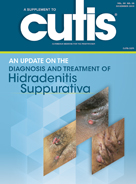
Hidradenitis suppurativa (HS) is a chronic, inflammatory, scarring disease that occurs most frequently along the milk lines of the body from axillae to groin, is most common in the second and third decades of life, and is rarely observed before puberty. It disproportionately affects women and is associated with a host of comorbidities and dramatically reduced quality of life. The delay from HS symptom onset to diagnosis is approximately 7 years, with drastic consequences for patient well being. Early diagnosis and treatment are of paramount importance. While several nonpharmacologic, pharmacologic, and surgical treatment modalities exist for HS, only one agent, adalimumab, has been approved by the US Food and Drug Administration for this indication. Lifestyle modifications, dietary changes, patient education, and psychosocial support are important components of HS therapy.

Hidradenitis suppurativa (HS) is a chronic, inflammatory, scarring disease that occurs most frequently along the milk lines of the body from axillae to groin, is most common in the second and third decades of life, and is rarely observed before puberty. It disproportionately affects women and is associated with a host of comorbidities and dramatically reduced quality of life. The delay from HS symptom onset to diagnosis is approximately 7 years, with drastic consequences for patient well being. Early diagnosis and treatment are of paramount importance. While several nonpharmacologic, pharmacologic, and surgical treatment modalities exist for HS, only one agent, adalimumab, has been approved by the US Food and Drug Administration for this indication. Lifestyle modifications, dietary changes, patient education, and psychosocial support are important components of HS therapy.

Cardiovascular Disease: From Milestones to Innovations
Supplement Editor:
Maan A. Fares, MD
Contents
Introduction: The transition from milestones to innovations
Maan a. Fares, MD
Transcatheter aortic valve replacement: History and current indications
Ahmad Zeeshan, MD; E. Murat Tuzcu, MD; Amar Krishnaswamy, MD; Samir Kapadia, MD; and Stephanie Mick, MD
Evolving strategies to prevent stroke and thromboembolism in nonvalvular atrial fibrillation
Ayman Hussein, MD; Walid Saliba, MD; and Oussama Wazni, MD
Stroke management and the impact of mobile stroke treatment units
Peter A. Rasmussen, MD
Biomarkers: Their potential in the diagnosis and treatment of heart failure
Barbara Heil, MD, and W.H. Wilson Tang, MD
Clinical challenges in diagnosing and managing adult hypertension
Joel Handler, MD
Supplement Editor:
Maan A. Fares, MD
Contents
Introduction: The transition from milestones to innovations
Maan a. Fares, MD
Transcatheter aortic valve replacement: History and current indications
Ahmad Zeeshan, MD; E. Murat Tuzcu, MD; Amar Krishnaswamy, MD; Samir Kapadia, MD; and Stephanie Mick, MD
Evolving strategies to prevent stroke and thromboembolism in nonvalvular atrial fibrillation
Ayman Hussein, MD; Walid Saliba, MD; and Oussama Wazni, MD
Stroke management and the impact of mobile stroke treatment units
Peter A. Rasmussen, MD
Biomarkers: Their potential in the diagnosis and treatment of heart failure
Barbara Heil, MD, and W.H. Wilson Tang, MD
Clinical challenges in diagnosing and managing adult hypertension
Joel Handler, MD
Supplement Editor:
Maan A. Fares, MD
Contents
Introduction: The transition from milestones to innovations
Maan a. Fares, MD
Transcatheter aortic valve replacement: History and current indications
Ahmad Zeeshan, MD; E. Murat Tuzcu, MD; Amar Krishnaswamy, MD; Samir Kapadia, MD; and Stephanie Mick, MD
Evolving strategies to prevent stroke and thromboembolism in nonvalvular atrial fibrillation
Ayman Hussein, MD; Walid Saliba, MD; and Oussama Wazni, MD
Stroke management and the impact of mobile stroke treatment units
Peter A. Rasmussen, MD
Biomarkers: Their potential in the diagnosis and treatment of heart failure
Barbara Heil, MD, and W.H. Wilson Tang, MD
Clinical challenges in diagnosing and managing adult hypertension
Joel Handler, MD
The Use of Dual Antiplatelet Therapy in High-Risk Patients With Acute Coronary Syndromes
Hot Topics in Primary Care
Click here to read the Full Supplement
Credit is awarded for successful completion of the online evaluations at the links below; these links may also be found within the supplement on the first page of each article.
CME CREDIT: "Individualizing Pharmacologic Management of Irritable Bowel Syndrome"
- To complete the online evaluation and receive 1 CME credit for this article: please click on the link at the end of the article or go to pceconsortium.org/ibs.
CME CREDIT: "Pharmacologic Approach to Obesity Management"
- To complete the online evaluation and receive 1 CME credit for this article: please click on the link at the end of the article or go to cme.iafp.com/ and find the article in the Post-Tests and Evaluation Only tab.
Click here to read the Full Supplement
Credit is awarded for successful completion of the online evaluations at the links below; these links may also be found within the supplement on the first page of each article.
CME CREDIT: "Individualizing Pharmacologic Management of Irritable Bowel Syndrome"
- To complete the online evaluation and receive 1 CME credit for this article: please click on the link at the end of the article or go to pceconsortium.org/ibs.
CME CREDIT: "Pharmacologic Approach to Obesity Management"
- To complete the online evaluation and receive 1 CME credit for this article: please click on the link at the end of the article or go to cme.iafp.com/ and find the article in the Post-Tests and Evaluation Only tab.
Click here to read the Full Supplement
Credit is awarded for successful completion of the online evaluations at the links below; these links may also be found within the supplement on the first page of each article.
CME CREDIT: "Individualizing Pharmacologic Management of Irritable Bowel Syndrome"
- To complete the online evaluation and receive 1 CME credit for this article: please click on the link at the end of the article or go to pceconsortium.org/ibs.
CME CREDIT: "Pharmacologic Approach to Obesity Management"
- To complete the online evaluation and receive 1 CME credit for this article: please click on the link at the end of the article or go to cme.iafp.com/ and find the article in the Post-Tests and Evaluation Only tab.


